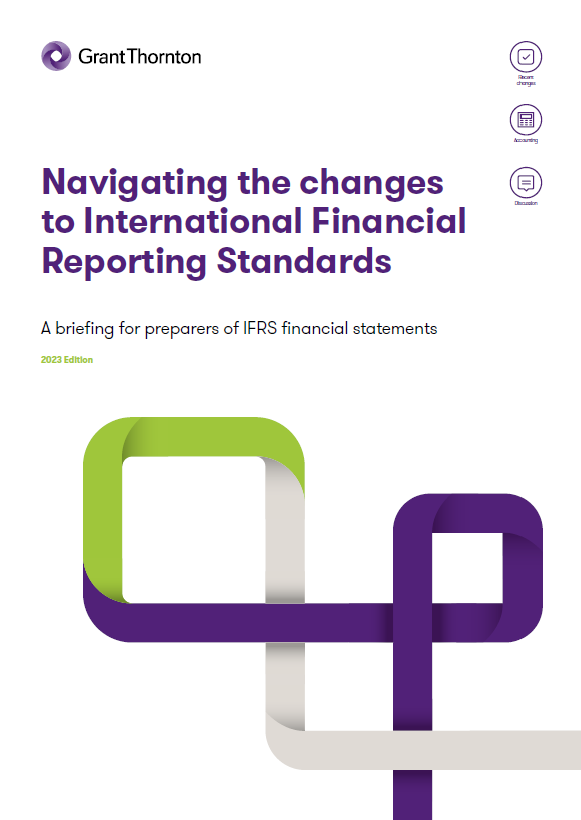-
Audit methodology
At Grant Thornton, we use a single audit methodology across our global network. This means that our clients gain the same proven, high-quality approach wherever they are.

-
Financial statements and consolidated financial statements
Preparation of monthly, quarterly or annual report and consolidated report on the basis of information presented by the client.
-
Financial Accounting
Effective bookkeeping and financial accounting are essential to the success of forward-thinking organisations. To get the optimum benefit from this part of your business, you'll need an experienced team behind you.
-
Tax compliance
Tax is likely to have an impact on almost every business decision you make. Whatever your business’s specific needs, we respond quickly and devise solutions tailored to you. We perform VAT, income tax, social tax and other tax accounting as well as present tax declarations to the tax authorities.
-
Chief financial officer service
Chief Financial Officer services include the periodic reporting, information systems standardization, internal document management and information flow optimization, budget preparation, cost accounting, cash flow and working capital management, financial analysis, investment return evaluation for managers.

-
International taxation
Grant Thornton operations in the Baltic States give us an access to the international expertise and allow advising the client on the minimisation of tax risks arising from conducting business in a foreign tax jurisdiction. We also consult foreign investors in finding an optimum group structure and form of enterprises in Lithuania and other Baltic States.
-
Transfer pricing
We advise the management bodies of local and multinational groups of companies in issues concerning transfer pricing of intra-group transactions and, if necessary, in the preparation of the relevant compliance documents. We also assist in preparing transfer pricing policies in order that future transactions are priced in accordance with the local as well as international regulations.
-
VAT refunds
We advise foreign clients in issues concerning the refund of value added tax paid in Lithuania, and Lithuanian clients – in the refund of value added tax paid in the EU member states. If necessary, we carry out these procedures on behalf of the client.
-
Profit tax, tax incentives
Our tax advisory department consults local and international clients in both everyday and specific taxation issues related to business activities.
-
Due diligence
Making the right investment decision can have a significant impact on shareholder value. To make an informed investment decision and create the best value from the transaction you will need the following an understanding of the target business identification and understanding of key business drivers an understanding of all the relevant issues clear analysis, conclusions and recommendations.
-
Assistance and representation during tax investigations, inspections, disputes
We provide services for registration in the Register of Taxpayers and the Register of VAT Payers. We represent clients' interests in tax disputes at the State Tax Inspectorate, Tax Disputes Commission, courts and other institutions.

-
Legal advisory for business start
We assist to quickly establish a company, branch or permanent establishment in Lithuania, open a bank account, VAT registration and obtain all necessary licenses for activity.
-
Legal advisory for business development
Our team has gained the greatest experience in advising international companies on the management of groups of companies. We advise and implement reorganizations or liquidations. Together with a team of tax and financial advisors, we perform a comprehensive due diligence (tax, legal & financial).
-
Labor law for CEOs and employees
We provide modern labor law solutions for the CEO, C-level managers and employees, which are tailored specifically to your business industry. We will take care of well-judged employment contracts and benefits package, protection of confidential information and non-compete agreements, handling of employee data or stock option rules, posting of employees, employment of EU and third-country nationals, organization of telework.
-
Fintech
With extensive experience in money laundering prevention and compliance and a strong team of financial experts, we advise clients on financial services, electronic money, licensing of payment institutions, capital formation, listing of mutual lending platform operators and other operational issues.
-
Migration and relocation
We assist you, your family members and employees of the organization to obtain national and European Union (Schengen) visas, residence permits, e-resident status, provide mediation letters and ensure a smooth relocation to Lithuania.
-
Due diligence
Making the right investment decision can have a significant impact on shareholder value. To make an informed investment decision and create the best value from the transaction you will need the following an understanding of the target business identification and understanding of key business drivers an understanding of all the relevant issues clear analysis, conclusions and recommendations.
-
Fintech advisory
The rapidly changing world and evolving technology are driving the development of new business models such as acting as a payment institution, a provider of virtual currency services and a financial institution. Grant Thornton Baltic provides support and advice to these companies.
-
Corporate finance management
Building a successful business requires a clear vision backed by a focused strategy. To achieve this vision, businesses must negotiate an increasingly complex environment.
-
Business Valuations
Choosing the right valuation method is the most important element in the process of estimating the fair value of a business as it must be adequate in terms of the purpose and object of the valuation. Grant Thornton uses only proven and generally accepted methods from among the wide range of income, asset and market approaches. Having conducted a preliminary analysis of the object and purpose of the valuation, we identify the method that will be the most appropriate considering the situation and characteristics of a given enterprise and the business sector in which it operates. Prior to commencing valuation, we also identify the documents necessary in the process.
-
Mergers and acquisitions
We provide advice to clients in all material aspects of the process of conducting transactions: finding a candidate for buyer, purchase or merger, initial analysis and valuation, negotiations, due diligence, structuring transaction price, preparing legal documentation and formal closing of the transaction. We also provide consultation for management buyouts.
-
Protection of Interests of Bondholders'
Grant Thornton provides bondholders' advocacy and protection services. We have resources, knowledge and the latest technology. Defending the interests of bondholders · Representing the interests of bondholders
-
External Financial Management Services
Providing an external financial management services makes it possible to manage a company’s finance on a day-to-day basis by a competent economist, without the need of offering full-time employment. By cooperating with experts on managing big-budget projects, we provide our clients with excellent support in comprehensive management of company’s finance.
-
Training
Financial Management Training and Seminars. Our experts have significant regional competence and close co-operation with our global colleagues. They happily share their expertise with our clients.

-
Internal Audit Services for Financial Sector Companies Licensed in Lithuania
Internal audit services adapted to Lithuanian financial sector companies ensure compliance with regulatory acts, risk management and operational excellence.
-
Internal Audit Services for EU/Foreign Aid Projects
Internal audit for EU/foreign aid fund projects helps to ensure compliance of activities and related costs with requirements.
-
Internal Audit for the Companies Certified by ISO
Internal auditing ensures ISO standard compliance, evaluates management system effectiveness, and gathers objective evidence of performance.
The new General Data Protection Regulation will enter into force in May 2018. That makes now the last time for public sector organisations, private sector companies and NGOs to start to evaluate whether and what changes they need to make in their personal data management systems – in other words, to carry out a compliance assessment. An important part of any activities is asking people for consent for processing their personal data, or updating the consent if the consent elicited in the past does not meet the requirements of the new regulation. Here it should be remembered that the new regulation will apply to all personal data the organisation has collected – even from before May 2018.
It should be considered that depending on the size of the organisation, the process of gaining clarity on what, if anything, needs to be changed, can take up to four to six months on average. Nor should it be forgotten that a risk assessment and data protection impact assessment should be carried out.
We advise every organisation to think about the responses to the following questions:
- What type of data do you collect? (Are they all compulsory under the new regulation or not?) If you collect other data (besides the ones set forth in legislation, such as for the purpose of advertising and marketing), are customers asked separately for consent for these and is there a verification trail for the consent?
- How do you retain personal data? (Are data systematised, can the person’s consent be viewed in the information system?)
- How long do you retain the data for?
- Do you ask customers to update their data? If you do, in what way and how often?
- Do you share data with third parties or foreign countries?
- Is the whole process, including data collection, retention, sharing with third parties etc. also described in the internal procedures?
- Are training courses related to personal data carried out among employees?
Services related to implementation of the General Data Protection Regulation
Grant Thornton has set up a three-tiered service plan to assist customers in a convenient and simple transition to the new regulation.
It is clear that organisations will have to evaluate whether, based on their everyday activity, they will need to make changes to either internal processes or IT systems. The first and most important step in evaluation is to carry out a self-evaluation within the organisation. To make the self-assessment as simple and streamlined as possible and to let customers know which requirements their internal activities need evaluation in relation to, we have developed a self-evaluation questionnaire for evaluating readiness for the changeover to the General Data Protection Regulation. Every organisation can use this questionnaire independently.
If the self-evaluation shows that not all processes and activities are in harmony with the regulation’s requirements, it would be appropriate to carry out a more detailed evaluation to see which personal data are collected, where they are kept, how their secure management is guaranteed, including how responsibility is defined within the organisation etc. The easiest way to do this is to conduct a compliance audit.Often the audit also means the need to map the personal data handling points, as organisations frequently don’t know where and what types of personal data reside in their systems. There’s no reason to worry that this audit will be particularly costly. As the evaluation is standardised, the audit can be conducted rapidly and efficiently and thus, it will be cost-effective for the customer. We should point out that the audit is not limited to evaluating processes: in the interests of giving customers maximum added value, our compliance audit also encompasses an assessment of the conformity of IT systems to the regulation’s data processing requirements. If the audit finds that the organisation needs to introduce developments in its information system to ensure compliance with the regulation’s requirements and to ensure secure handling of data, we will prepare an IT system development term sheet for your information system developer. As preparing such term sheet for IT system development is time-consuming, having previously carried out the compliance audit gives us the knowledge of what must be modified in the organisation’s information system’s structure or functionality and how it should be done, as a result of which preparing the terms of reference is a simple and logical step.
The new regulation also mentions preparation of a data protection impact assessment. As all organisations are different, the impact assessment must be customised to each organisation – based on what personal data are gathered and processed, for what purpose and how, and what are the functionalities of the IT systems, among other considerations. An impact assessment must be drawn up by all data processors where the rights and liberties of individuals will likely be subject to high risk, considering the type, scope, context and purposes of processing personal data. This group includes, e.g. tracking cookies, IP addresses and access to premises, financial sector services (investment, insurance etc.), processing of health data, users’ data processing in online stores, processing data on customer card purchases in retail enterprises, data processing where personal data sets originating from different sources are compared (Big Data processing) and more.


